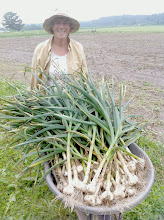skip to main |
skip to sidebar
 Here is an update on the addition to the house. Last we saw the spruce trees, they were being sawed up for lumber for the addition. After 3 months of drying, Mark returned and we re-sawed them to size. Here is the work on the house so far. The OSB is covering up the window space but I will post pictures when it is further along.
Here is an update on the addition to the house. Last we saw the spruce trees, they were being sawed up for lumber for the addition. After 3 months of drying, Mark returned and we re-sawed them to size. Here is the work on the house so far. The OSB is covering up the window space but I will post pictures when it is further along. The next step will be to insulate and shingles. The siding will match the house. Trying to figure out how to fit some furniture inside is a fun puzzle.
The next step will be to insulate and shingles. The siding will match the house. Trying to figure out how to fit some furniture inside is a fun puzzle.
 Some people spend money on spas or jewelry; I like to spend money on inventions and experiments. The latest is the green machine to roll down rye. Even appropriate technology has trends and fads and the newest is rye roll down. There are advantages to conventional no-till agriculture. The soil is not disturbed; there is less erosion etc. Much of it depends on using herbicides to kill the existing plant cover. When you grow winter rye and roll it down in the flowering stage, it dies. Jury is out. Much of the university research on this is being done where the spring and summer are longer and the rye matures early enough to then plant crops into the rolled down rye. The rye suppresses the weeds and adds organic matter to the soil. This takes some heavy metal to crimp and kill the rye. The green machine fills with water to add weight to it. Transplanting into the flattened rye is tricky too and I have yet to get my transplanter set up well enough. Spending more money is inevitable. Some of my experiments are successful and some are not. The local welder often shakes his head at the equipment he builds. Is it worth the money? Yes! American farmers have long been the innovators of the country developing all kinds of new technology.
Some people spend money on spas or jewelry; I like to spend money on inventions and experiments. The latest is the green machine to roll down rye. Even appropriate technology has trends and fads and the newest is rye roll down. There are advantages to conventional no-till agriculture. The soil is not disturbed; there is less erosion etc. Much of it depends on using herbicides to kill the existing plant cover. When you grow winter rye and roll it down in the flowering stage, it dies. Jury is out. Much of the university research on this is being done where the spring and summer are longer and the rye matures early enough to then plant crops into the rolled down rye. The rye suppresses the weeds and adds organic matter to the soil. This takes some heavy metal to crimp and kill the rye. The green machine fills with water to add weight to it. Transplanting into the flattened rye is tricky too and I have yet to get my transplanter set up well enough. Spending more money is inevitable. Some of my experiments are successful and some are not. The local welder often shakes his head at the equipment he builds. Is it worth the money? Yes! American farmers have long been the innovators of the country developing all kinds of new technology.
How is the experiment going? In the fall, I planted rye and then when it germinated, I used the small rototiller to make rows without rye. This allowed me to plant the pumpkins and winter squash before the rye was ready to roll down and I could use my regular transplanter. Drip tape was laid as the plants were transplanted in case of dry weather. I rolled the rye and hairy vetch mix. It killed the rye but not the vetch and I will hit it again with the green machine. If the vetch does not die, I will need to mow several times and the plants will be at risk of being smothered by this aggressive plant. Next steps: work with the welder to attach a trash coulter and chisel tooth to the transplanter to allow it to plant right into the rye. I'll keep you posted.
 "Storms may produce large hail and strong winds." Those are the words a farmer hates to read in the forcast. Before meteorologists and forecasts, we didn't know what was coming except by watching the sky, noticing if the flies were biting or whether the underside of the oak leaves were exposed. For the last 3 days, I have been rushing around because it might rain. It hasn't. At 6:00 a.m. I jumped from bed having realized that I could till between the plastic mulch rows before it rained. Its 9:30 at night and it still hasn't rained.
"Storms may produce large hail and strong winds." Those are the words a farmer hates to read in the forcast. Before meteorologists and forecasts, we didn't know what was coming except by watching the sky, noticing if the flies were biting or whether the underside of the oak leaves were exposed. For the last 3 days, I have been rushing around because it might rain. It hasn't. At 6:00 a.m. I jumped from bed having realized that I could till between the plastic mulch rows before it rained. Its 9:30 at night and it still hasn't rained.
I am not a native of the Midwest. Garrison Keilor on A Prairie Home Companion has made me smile with descriptions of the "don't get too hopeful, things could get worse" part of the Midwest. After the tornado, I suddenly saw the root of this feeling and understood it better. We had just finished moving the hoop houses when one was destroyed in the winds. At least for now, things feel more tenuous. They feel tenuous and I have neighbors close, telephones, forecasts, and a local grocery store full of food. This past week I have been thinking about the early European settlers on the plains who had to survive by their own effort and hard work. I am honored to be among those who work the land.
 Here is an update on the addition to the house. Last we saw the spruce trees, they were being sawed up for lumber for the addition. After 3 months of drying, Mark returned and we re-sawed them to size. Here is the work on the house so far. The OSB is covering up the window space but I will post pictures when it is further along.
Here is an update on the addition to the house. Last we saw the spruce trees, they were being sawed up for lumber for the addition. After 3 months of drying, Mark returned and we re-sawed them to size. Here is the work on the house so far. The OSB is covering up the window space but I will post pictures when it is further along.



